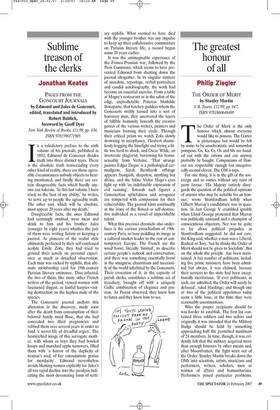Sublime treason of the clerks
Jonathan Keates PAGES FROM THE GONCOURT JOURNALS by Edmond and Jules de Goncourt, edited, translated and introduced by Robert Baldick, foreword by Geoff Dyer New York Review of Books, £11.99, pp. 434, ISBN 9781590171905 1 n a valedictory preface to the sixth volume of his journals, published in 1892, Edmond de Goncourt divides truth into three distinct types. There is the absolute truth transcending every other kind of reality, there are those agreeable circumstances nobody objects to hearing mentioned, and finally there are certain disagreeable facts which hardly anyone can tolerate. 'In this last volume I have tried, to the best of my ability,' he writes, 'to serve up to people the agreeable truth. The other sort, which will be absolute, must appear 20 years after my death.'
Disagreeable facts, the ones Edmond had seemingly omitted, were meat and drink to him and his brother Jules (younger by eight years) whether the pair of them were writing fiction or keeping a journal. As pioneers of the realist style ultimately perfected by their self-confessed acolyte Emile Zola, they had tried to ground their novels on personal experience as much as detached observation. Each man was racked by syphilis, that ultimate membership card for 19th-century Parisian literary eminence. Thus infected, the two of them, like many other French writers of the period, viewed women with fascinated disgust, as lustful harpies visiting destruction on the hapless male of the species.
The Goncourts' journal anchors this alienation in the discovery, made soon after the death from consumption of their beloved family maid Rose, that she had concealed two illicit pregnancies and robbed them over several years in order to fund 'a secret life of dreadful orgies'. The besmirched image of this surrogate mother, with whom as boys they had bowled hoops and munched apple turnovers, filled them with 'a horror of the duplicity of woman's soul, of her consummate genius for mendacity'. Edmond nevertheless avoids blaming women explicitly for Jules's all too rapid decline into the paralysis indicating the most devastating form of tertiary syphilis. What seemed to have died with the younger brother was any impulse to keep up their collaborative commentary on Parisian literary life, a record begun some 20 years earlier.
It was the unimaginable experience of the Franco-Prussian war, followed by the Paris Commune, which seems to have prevented Edmond from shutting down the journal altogether. In its singular mixture of anecdote, reportage, verbal portraiture and candid autobiography, the work had become an essential exercise. From a table at Magny's restaurant or in the salon of the edgy, unpredictable Princess Mathilde Bonaparte, that tutelary goddess whom the Goncourts swiftly turned into a sort of honorary man, they uncovered the layers of fallible humanity beneath the creative genius of the various writers, painters and musicians forming their circle. Through their critical prism we watch Zola slowly drowning in sycophancy, Flaubert shamelessly hogging the limelight and trying a little too hard to shock, and Oscar Wilde, an inveterate plagiarist, borrowing his homosexuality from Verlaine. 'That strange painter Edgar Degas' is a pathological curmudgeon, Sarah Bernhardt offstage appears frumpish, shapeless, anything but divine, and the feline Victor Hugo's eyes light up with 'an indefinable expression of evil cunning'. Towards such figures a Goncourtian spitefulness and arrogance are tempered with compassion for their vulnerability. The journal hints continually at the irony of the flawed or self-destructive individual as a vessel of imperishable talent.
What this precious chronicle also underlines is the curious parochialism of 19thcentury Paris, so busy peddling its image as a cultural market-leader to the rest of contemporary Europe. The French use the word borne, literally 'limited', to describe certain people's outlook and conversation, and there was something essentially borne in the smugness, chauvinism and incuriosity of the world inhabited by the Goncourts. Their evocation of it, in the capacity of parish clerks, constitutes a sublime act of treachery, brought off with a uniquely Gallic combination of elegance and passion. As Proust observed, they knew how to listen and they knew how to see.






















































 Previous page
Previous page